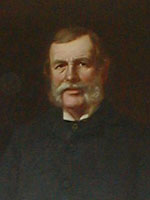Henry Gardner | |
|---|---|
 Portrait by Jean Paul Selinger, 1890 | |
| 23rd Governor of Massachusetts | |
| In office January 4, 1855 – January 7, 1858 | |
| Lieutenant | |
| Preceded by | Emory Washburn |
| Succeeded by | Nathaniel P. Banks |
| President of the Boston Common Council[1] | |
| In office 1852 | |
| Preceded by | Francis Brinley |
| Succeeded by | Alexander H. Rice |
| Member of the Boston Common Council from Ward 4[1] | |
| In office 1851–1853 | |
| Personal details | |
| Born | Henry Joseph Gardner June 14, 1819 Dorchester, Massachusetts |
| Died | July 21, 1892 (aged 73) Milton, Massachusetts |
| Political party | |
| Profession |
|
Henry Joseph Gardner (June 14, 1819 – July 21, 1892) was the 23rd Governor of Massachusetts, serving from 1855 to 1858. Gardner, a Know Nothing, was elected governor as part of the sweeping victory of Know Nothing candidates in the Massachusetts elections of 1854.
Born in Dorchester, Gardner was a dry goods merchant from Boston active in the local Whig Party in the early 1850s. With the sudden and secretive rise of the nativist Know Nothings in 1854, Gardner opportunistically[2] repudiated previously-held positions, and joined the movement, winning a landslide victory over Whig Emory Washburn. During his three terms in office the Know Nothing legislatures enacted legislation on a wide-ranging reform agenda, and made several significant changes to the state constitution, including important electoral reforms such as the replacement of majority voting with plurality voting.
The Know Nothing movement began to disintegrate not long after its 1854 victory, dividing over slavery. Gardner won reelection in 1856 only with Republican support, given in exchange for Know Nothing support for the Republican presidential candidate, John Frémont. Republican Nathaniel Prentice Banks easily defeated Gardner in 1857, and the Know Nothing movement effectively dissolved. By 1860 Gardner had left politics and returned to his business interests; he died in relative obscurity.
- ^ a b "A Catalogue of the City Councils of Boston, 1822-1908, Roxbury, 1846-1867, Charlestown, 1847-1873 and of the Selectmen of Boston, 1634-1822: Also of Various Other Town and Municipal Officers". City of Boston Printing Department. 1909. p. 89. Retrieved 30 October 2022.
- ^ Cite error: The named reference
Gienapp136was invoked but never defined (see the help page).